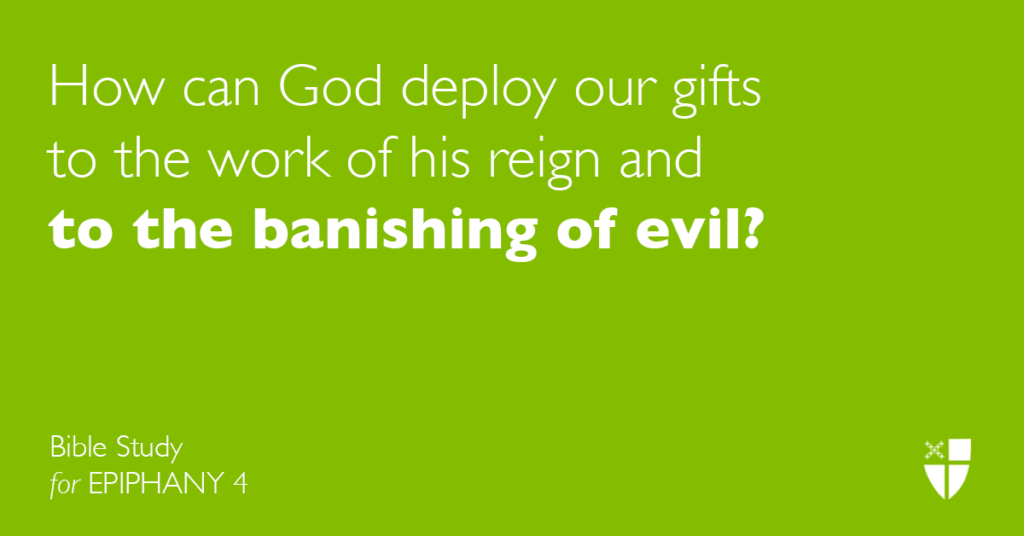This page is available in: Español
Bible Study: Epiphany 4 (B) – 2021
January 31, 2021
RCL: Deuteronomy 18:15-20; Psalm 111; 1 Corinthians 8:1-13; Mark 1:21-28

Deuteronomy 18:15-20
Epiphanytide is a meditation on God’s announcing and disclosing of himself in the varying activities of Jesus’ life. The Mysteries the Church explores on these Sundays following the feast (the visit of the Magi, Jesus’ Baptism, the Transfiguration, the Wedding at Cana, etc.) are concerned with Jesus showing just who he is and how he fulfills the promises God has made throughout salvation history. This includes the Lord’s promise to raise up a prophet like Moses in our reading from Deuteronomy.
But what is it that makes Moses a prophet and Jesus the fulfillment of this prophecy? Moses’ privilege was not solely that he was the custodian of God’s power of deliverance from bondage in Egypt and in the delivering of the Law to the People. Moses’ identity instead stems from that the Lord would “speak to Moses face to face, as one speaks to a friend.” But even this had its limits. On Sinai, Moses had to be protected like every other mortal from seeing the Lord’s glory, or he would die. Not so with Jesus. As St. John tells us, “No one has ever seen God. It is God the only Son, who is close to the Father’s heart, who has made him known.”
Throughout the Gospels, we will find further parallels between the lives of Moses and Jesus. This is intentional on the part of the Evangelists. Recall the Massacre of the Innocents, the Sermon on the Mount, and the Transfiguration on Tabor. But more importantly, recall the repeated references to Jesus going away to pray and converse with God “face to face” like Moses in the Tabernacle.
- What does this passage teach us about a theology of Scripture? Of Jesus’s identity as a “new” Moses?
Psalm 111
We might see this psalm in some sense as “looking behind the veil” at the heart of the prophet who converses with God. The psalmist praises and thanks the Lord chiefly for his saving actions in history for the Covenant People.
The resonances with the Exodus narrative are obvious and supplement what we’ve already considered about Moses in our reading from Deuteronomy. The patristic practice of putting the psalms “on the lips of Christ” only avails richer meditation. The subtext of these passages is that there is an essential correspondence between what God has done in the history of Israel which is finally consummated in the Paschal Mystery of Christ.
- Does this Psalm help to answer our previous question about Jesus’ status as God’s prophet?
- Considering its liturgical use, does it tell us anything about praise? Christian worship?
1 Corinthians 8:1-13
What do St. Paul’s thoughts on Hellenistic temple food practices (purchased meat was often taken from the animal sacrificed on pagan altars) and the delicate consciences of certain Corinthian Christians have to do with the disclosure of the Paschal Mystery? To be a bit perplexed, look further in the letter: “I imply that what pagans sacrifice, they sacrifice to demons and not to God. I do not want you to be partners with demons.” Doesn’t this seem to contradict what he says in our passage? Do the demons behind the idols exist or do they not?
What Paul seems to be implying is that even though the forces of the Enemy exist, they no longer have the power to afflict those for whom “there is one God, the Father… and one Lord, Jesus Christ.” Christians then should indulge the consciences of those who wish to divest themselves of the surrounding culture’s complicit stance with “the ruler of the power of the air.”
As our Gospel reading will make clear, Christian experience has understood Jesus’ mission as the liberation of the human community from the kingdom of Satan and his fallen angels by the ushering in of the Reign of God. The liberty Paul speaks of is the Church’s exodus from darkness and sin into the light of God’s redemption in Christ.
- Does Scripture’s explicit demonology make us uncomfortable? What’s really behind our variance to it or our attempts to “demythologize” it away? Do we lose a dimension of the Gospel doing so?
Mark 1:21-28
Epiphanytide is the Church’s means to “chew over” those moments in Jesus’s life and ministry where he particularly disclosed his identity as the Messiah, our Deliverer and Redeemer. Mark’s Jesus is curt and impatient. He is on a mission to dismantle the system of evil we see around us. His Gospel is particularly interested in displaying how Jesus’ power extends into dispelling the works of Satan. Jesus’ command over the unclean spirits, his enmity with the forces that seek our oppression and ruin, is total.
But what about Moses? Remember Mount Nebo, where he is delivering his sermons in Deuteronomy. Moses can only peer into and not enter the Promised Land. And the salvation God promises through Israel isn’t completed when they cross the Jordan. It’s the promised prophet who converses with God “face to face” – Jesus Christ – who announces the age of the final Exodus into the reign of God.
- Where do we see the Enemy still oppressing individuals and the wider human family?
- How can God deploy our gifts to the work of his reign and to the banishing of evil?
This page is available in: Español
Don’t forget to subscribe to the Sermons That Work podcast to hear this sermon and more on your favorite podcasting app! Recordings are released the Thursday before each liturgical date.
Receive Free Weekly Sermons That Work Resources!
This page is available in: Español


